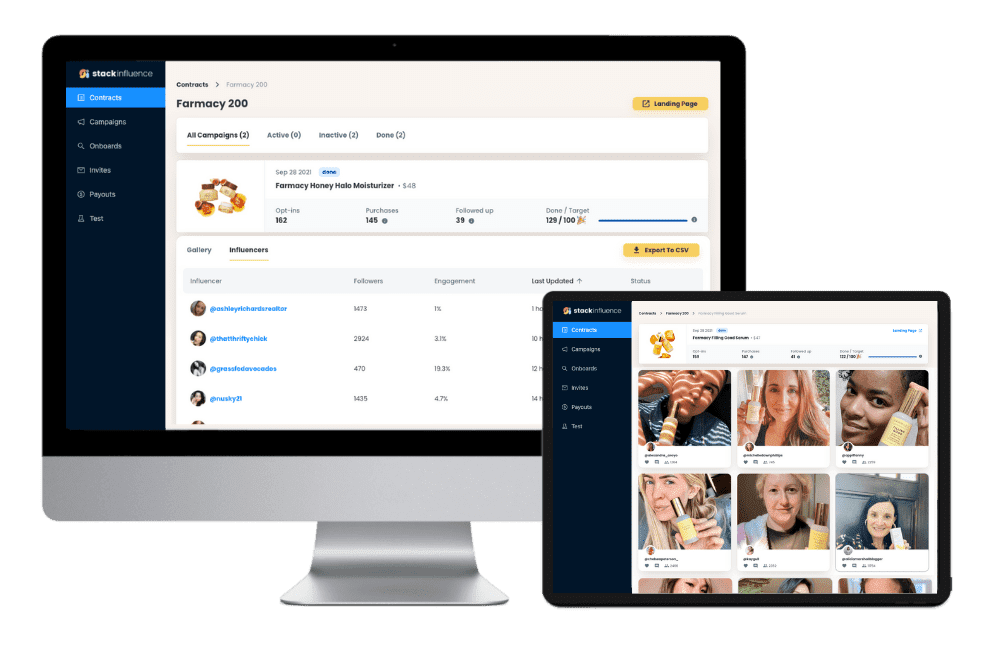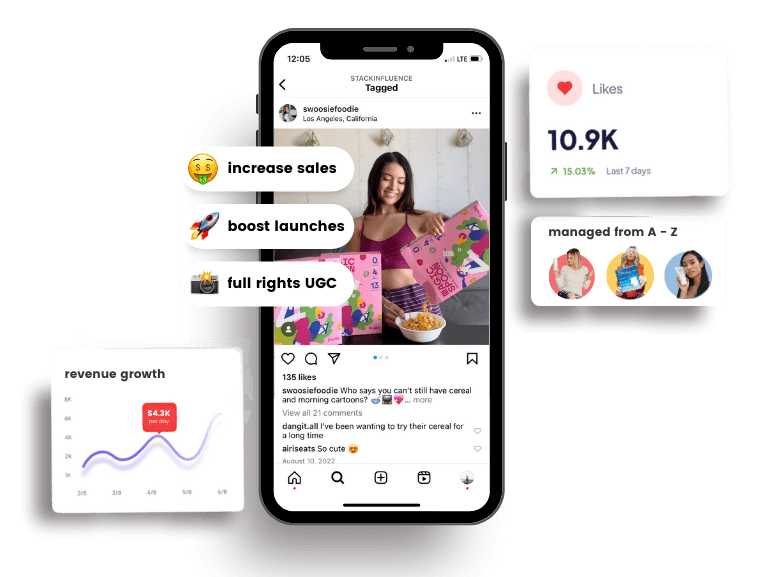Guide to Product Seeding
Amazon Influencers
Influencer Marketing
Amazon Marketplace
In the world of social media marketing, one strategy that’s gained significant traction is Influencer Product Seeding. Essentially, this approach involves brands giving their products for free (or ‘seeding’ them) to influential social media figures, who then promote and showcase those items to their substantial online audience.
Product seeding is more than just an exchange of merchandise for visibility; it’s a strategic move for brands.
At its core, product seeding taps into the principle of social proof — the idea that we humans tend to replicate the behavior of those we respect or admire.
If an influencer, whose lifestyle and choices a follower may aspire to emulate, uses a certain product, it sends a convincing message about the product’s value.
Is it worth it? The numbers suggest that it can be a hugely impactful ecommerce growth strategy.
According to a study by Tomoson, businesses are making $6.50 for every $1 spent on influencer marketing. Moreover, Influencer Marketing Hub found that companies have a 18x higher audience engagement using influencer product seeding.
However, it’s important to note that while this strategy can be hugely rewarding, it’s not a universal solution for every brand or product.
The effectiveness of influencer product seeding depends largely on the quality and relevance of the influencer-brand partnership. A mismatch, such as a fitness influencer promoting a fast-food product, could confuse audiences and undermine the brand’s message.
And let’s not forget the ethical aspect. Some critics argue that product seeding can be misleading, especially if influencers don’t disclose they’ve received the product for free.
It’s crucial for influencers and brands to follow guidelines like the FTC’s Endorsement Guides to ensure transparency.
So there you have it – an overview of influencer product seeding. In the sections to follow, we’ll go through the step-by-step guide on how to execute this strategy, select influencers, and assess its effectiveness.
Planning
Here are two essential steps:
1. Define Your Marketing Goals
When it comes to influencer product seeding, different brands might have different goals.
Some brands might consider this strategy to increase brand awareness or product visibility, while others might aim for boosting sales or gaining social media followers. In fact, around 85% of marketers named increasing brand awareness as their top goal for influencer marketing campaigns.
Whatever your goal might be, define it clearly before starting. Having a clear understanding of what you want to achieve from this collaboration will help drive the campaign’s direction and gauge its success at the end.
2. Identifying Your Target Audience
With the rise of customer-centric marketing, 71% of marketers believe that a strong understanding of their audience’s preferences and interests leads to a successful campaign.
Identifying your target audience has two-fold benefits:
- It enables you to choose the right influencer: If an influencer’s audience closely matches your target audience, their endorsement is more likely to resonate with potential customers.
- It helps you select the right seeding product: You can choose the product that is more relevant and appealing to your target audience, increasing the chance of seeding success.
Choosing the Right Influencers
1. Identifying potential influencers
When we think of influencers, the first names to pop up are usually mega-celebrities with millions of followers. However, studies show that influencers with smaller, more engagement-rich followings known as micro-influencers, might sometimes yield better results.
Determine which type of influencers – macro or micro – would work best for your campaign considering your goals and target audience.
Popular social platforms for finding influencers include Instagram, YouTube, TikTok, and Twitter. Select the one which your target audience utilizes most frequently.
- The quality and type of their content
- Their audience demographics
- The authenticity of their engagement (watch out for fake followers!)
- Their reputation and credibility in the industry
2. Reaching out to identified influencers
3. Negotiate terms
Okay, so your influencer has shown interest – fantastic! The next step is to negotiate the terms. While product seeding generally means that influencers will receive your product for free, there may be other costs involved depending on the influencer’s rates and the extent of the promotion required.
Think about the detailed expectations you have: How often should they post about the product? Do you want a review or just product photos? Setting clear terms will ensure a smooth collaboration.
Choosing the right influencer requires a mix of analytics, intuition, and negotiation, but with thoughtful consideration and a bit of tenacity, you can increase your campaign’s chances for success.
Product Selection
Let’s explore some factors that can influence your product selection:
1. Product Relevance
2. Influencer Preference
3. Competitive Landscape
When selecting a product, consider the competitive landscape in the market. If you can offer a product that is unique or has a key differentiation factor, it could make your product stand out and intrigue the influencer’s audience. In fact, 37% of consumers trust social media influencers to inform their purchasing decisions over brands.
4. New or Best-selling Products
- It increases the likelihood of higher interest and engagement from viewers
- Influencers might be more excited and eager to promote an updated, popular or exclusive product
The bottom line is that product selection should be a strategic and well-thought-out process in alignment with your campaign objectives, target audience, and influencer preferences. A product that ticks these boxes is more likely to drive engagement, conversions, and eventual success.
Product Delivery
Here’s what you need to know:
1. Packaging:
Now, you might wonder, ‘Why does packaging matter? Isn’t it the product inside that counts?’ Well, yes and no. Although the product is the star, the packaging can set the stage for a more memorable unboxing experience.
Consider this: influencers are content creators – and great content requires an element of surprise, delight, or intrigue. That’s precisely what an aesthetically pleasing, thoughtfully created package can offer.
According to a Dotcom Distribution study, 40% of consumers would likely share an image of a delivery if it came in a unique package. This is why brands increasingly explore solutions such as sustainable shipping boxes that combine creativity with responsibility. So, invest time and resources to create packaging that represents your brand and excites the receiver.
2. Include personalized notes:
3. Timing is everything:
Schedule your product delivery at a time that aligns with your overall marketing plan. Coordinating the unboxing experience with a product launch, sale, or event can generate more buzz and interest.
4. Tracking and confirmation:
Remember, your seeding strategy doesn’t end with the product leaving your hands – ensure it arrives in mint condition and creates a lasting first impression on influencers. That’s when the real magic of influencer product seeding begins to happen!

Unlock the Power of Micro Influencers and Elevate your Brand Today!

Track the Influencer’s Promotion
Here’s a guide to help you gauge the effectiveness of your influencer product seeding campaign:
1. Monitor posts and interactions
Keep an eye on the following:
- Quality and adherence to your guidelines
- Engagement rate (likes, shares, comments)
- Sentiment of the audience’s reactions (positive or negative)
It’s important to remember that around 90% of people trust recommendations from influencers over traditional advertisements. Hence, positive interactions can significantly impact your brand and sales.
2. Track relevant KPIs (Key Performance Indicators)
As mentioned earlier, defining your marketing goals is crucial. Based on these goals, determine the KPIs you need to track. These can include:
- Reach or impressions
- Engagement (likes, comments, shares)
- Click-through rate (for dedicated links)
- Conversion rate (sales generated)
- New followers on your social media channels
Tracking relevant KPIs allows you to quantify the success of your campaign and make data-driven decisions.
3. Use unique URLs or promo codes
By providing the influencer with a unique URL or promo code to share with their audience, you can directly track clicks, conversions, and sales generated from their promotion. This makes it easier to measure your ROI (return on investment) and determine the effectiveness of your product seeding campaign.
4. Communicate with the influencer
Effective tracking and monitoring product seeding campaigns can help you optimize your marketing strategies, create better relationships with influencers, and, ultimately, drive better results. So make sure you have a proper plan and tools in place to get the most out of your collaboration.
Evaluate Results
1. Collate and Analyze Tracking Data
You’ve kept a close eye on the influencer’s promotion and have tracked numerous KPIs. It’s now time to collate this data and conduct a thorough assessment.
Remember that reach and impressions are only the starting point. More importantly, you’re looking for initiatives that generate high engagement rates, click-through rates, and ultimately, conversions.
2. Define Success Using Benchmark Data
What does success look like for your product seeding campaign? It’s essential to have a clear definition.
Benchmark data can provide a reference frame on what to expect. For instance, the average engagement rates on Instagram for influencer collaborations hover around 1.22%. If your campaign managed to drive an engagement rate significantly higher than this, you’re definitely on the right track.
3. Take Note of Unanticipated Results
Getting to know these not-so-obvious impacts can provide valuable insights into which influencer and audience characteristics sync well with your brand.
4. Gather and Apply Feedback
For example, if an influencer found it challenging to get enthusiastic about a certain product, this might signal the need for a pivot in product selection.
Evaluating your campaign results is not about assigning a pass or fail grade to your efforts. Instead, it’s about learning and evolving your product seeding strategy. Remember, each campaign is a new opportunity to connect with potential customers and boost brand awareness, so make sure you’re making the most of it!
Conclusion
Crafting and executing an effective product seeding strategy may seem like a lot of work, boosted by influencer marketing’s raving success with an impressive 11 times higher ROI than traditional advertising. And with 86% of women turning to social networks before making a purchase, coupling your strategy with influencer marketing seems like an obvious win.
Throughout your journey of product seeding, you’ve learned that the process isn’t simply edging your products into the influencer’s hands but making strategic decisions at every step:
- Researching your ideal influencers based on their relevance and audience match.
- Reaching out with appealing collaboration proposals and fostering meaningful relationships.
- Packaging your products thoughtfully to provide a memorable unboxing experience.
- Tracking the promotion with relevant KPIs to gauge campaign performance.
- Evaluating the results in order to learn, adapt, and improve future campaigns.
On that note, as you venture further into product seeding, keep refining your strategy based on your learnings. Stay agile, adaptable, and remember: the true crux of product seeding isn’t just about providing free products, but more about creating a community of people who appreciate and love your brand. And that, as they say, is priceless.
Want new articles before they get published?
Subscribe to our Awesome Newsletter.
Want new articles before they get published? Subscribe to our Awesome Newsletter.
stack up your influence
turning creativity into currency
our headquarters
111 NE 1st St, Miami, FL 33132
our contact info
[email protected]
stack up your influence
turning creativity into currency
our headquarters
111 NE 1st St, 8th Floor
Miami, FL 33132


